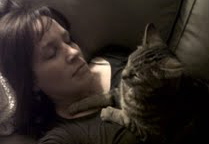Sleep. Birds do it, bees do it, even educated fleas do it. (It's true. I looked it up.)
I thought of this blog title while still in bed on Saturday morning. I woke up at 8:19am, the latest I have slept in years, and was just so happy I didn’t have to get up! I felt good, which one should after 9 hours of sleep, and marveled that I appear to need so much sleep at the ripe old age of 45.
We have all read reports that claim adults need 7-8 hours of sleep per day, and teenagers more like 9-10. I’ve been poking around the internet and have found that sleeping too little can double your risk of cardiovascular disease, but sleeping too much also shows a higher correlation with morbidity! Did you know there is even a study stating self-reported sleep is only “moderately” correlated with actual sleep? It’s called sleep-state misperception.
Figuring out the optimal number of hours to sleep adds way too much pressure in our lives. We already need to calculate our calorie intake, figure out the how much Vitamin D and calcium to take, get some kind of exercise every week (and don't forget the weight training, which staves off osteoperosis), go to work, and interact with our families! I like the vague definition that if you’re not abnormally tired during the day, you had enough sleep. Personally, my story has always been that I need 6 hours a night to function, 7 hours to be nice, and 8 to have a really good day. And yet so many of my friends are fine with just 5 or 6 hours. Why IS that!?
Circadian rhythms (from circa, meaning around, and diem, meaning day) are essentially 24-hour built-in clocks that determine the timing of our main behavioural and physiological functions - everything from blood pressure, temperature, hormone release, and yes, sleep patterns. Interestingly, these rhythms are adjusted by a number of external influences (called zeitgeibers – how’s that for a Good Word – it's German for "time giver"), including social behaviour, eating and drinking patterns, and the most influential – light. Everyone's circadian rhythms are unique, and adjust over time to our lifestyles. But since my lifestyle and schedule aren't particularly out of the ordinary, it still doesn't explain why I seem to need more sleep than some.
Well, in addition to my own natural circadian rhythms, how much sleep I need may have something to do with genetics. One article actually referred to "genetic mutations" that cause someone to need more or less sleep. I refuse to think of myself as a mutant, so I'll just blame my Dad - he has always been a good sleeper, and my Mum tells me that "you're just like your father". Apparently I needed more sleep than any of my three sisters – from a baby I was a good sleeper and a frequent napper, and I still nap to this day.
 |
| I was taught early that napping with a cat was very effective. |
Which brings me to another topic… the Power Nap.
There is a quote by comedian Carrie P. Snow, “no day is so bad that it can’t be fixed with a nap.” I don’t know about that, but I do know that a nap can make any day better.
 |
| I still follow that rule most weekends. |
There are two kinds of naps for me: one is the weekend afternoon nap that just comes over you – you’re at the cottage and the rain is pelting down on the roof, or you’re in front of the fire on a winter afternoon listening to the crackle and pop of the firewood, or you’re swinging in a hammock with a good book that has fallen open on your chest as you snooze and sway. Often there’s a dog or cat involved in that kind of nap. It is restorative in that it helps add back to the “sleep bank” which has been sadly abused during the previous busy week. Some of those naps are hours long, and you often awake feeling groggy, but satisfied.
The other kind is the Power Nap. These are intentional, 20-25 minutes naps for which you set a timer. You wake feeling energized, and you have a boost for the rest of the day. The Japanese corporate approach caused the Power Nap to make headlines back in 2006, and yet it has been slow to catch on in Corporate America. But the benefits of the Power Nap have been confirmed over and over; done properly, a 20 minute nap can reduce your need for caffeine boosts, reduce stress, improve your memory, creativity, and cognitive functioning, and even motivate exercise (!!).
If only we could work those into our productivity-crazy culture. This afternoon I would have been so happy to nod off for just a few minutes, but I decided that it would be a bad idea to put my head down on the board room table in the middle of a meeting.
I do have a yoga mat in my office… maybe I should use it and pull a Costanza. Enjoy this clip - but not before bed. It may keep you awake.
I have never in my life been physically able to nap- until I had a child. Now I can literally *decide* to have a nap- lie down, close my eyes and be out for a Power Nap in about 3 minutes flat. Also, I recently discovered that I have had sleep apnea my whole life, which was robbing me of restorative sleep... the solution for me has been as simple as switching to my side to sleep... apnea gone! Feel amazing!
ReplyDeleteI always wish I slept longer -- I'm just a light sleeper and it doesn't take much to wake me. I'm with you on afternoon naps. They're great!
ReplyDelete